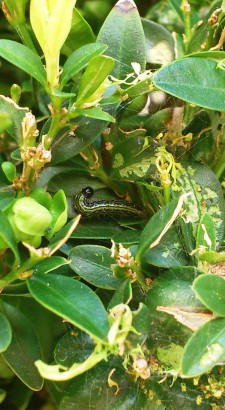SAVEBUXUS : Development and evaluation of biocontrol solutions against the box tree moth and box blight

Project details
- Lead : Plante & Cité, ASTREDHOR
- Partners : INRA Avignon, SumiAgro France, Koppert France, CDHR Centre, AREXHOR Grand-Est, AREXHOR Seine-Manche, GIE Plantes and Fleurs Sud-Ouest, The cities of Paris, Mulhouse, Lyon, Gaillard, Orléans, Nantes, Antibes and Avignon, Kristoff Paysage, Société Alsacienne d'Entomologie, FREDON Pays de la Loire, FDGDON 84, FREDON Rhône-Alpes, FREDON Aquitaine, FREDON Alsace, FREDON Ile-de-France, Disneyland Paris, Jardin du Luxembourg
- Duration : 2014-2020, project in progress
- Plante & Cité correspondent : Maxime Guerin
- Funding : Plante & Cité, Végépolys, Val'hor, AFB (Ecophyto), FranceAgriMer, French Ministry of Culture and Communication (Ministère de la Culture et de la Communication), Koppert France, Région Pays de la Loire, Fondation de France
- Themes : Integrated pest and weed management
- Sub-themes : Control and biocontrol methods, Prevention – prophylaxis – monitoring, Identification and management of pest organisms
- Key words: Cylindrocladiose – box tree moth - biology – box tree - box blight – integrated pest management - biocontrol - pheromone trap - strategy
Objectives
- To identify and develop biocontrol solutions against the box tree moth and box blight.
- To develop a control strategy of these pests.
- To study alternatives to box tree.
Abstract
In recent years, box tree has been under attack from several emerging pests that have caused extensive damage – devastating many heritage sites and the supplies of local producers. The box tree moth (Cydalima perspectalis) remains prevalent in the environment, and box blight (Cylindrocladium buxicola, Volutella buxi) have caused huge declines in box tree populations since the late 2000s in France.
The combination of these two emerging problems is a unique case, and professionals of green spaces and box tree producers can testify to the extraordinary virulence of these organisms. Current management strategies are not totally effective, so these pests are not sustainably managed. Although under-studied, some alternative solutions to chemical control provide effective ways to control pests; SaveBuxus, the programme coordinated by ASTREDHOR and Plante & Cité, explores some of these solutions in order to propose an effective control strategy against these pests.
Method
This project implements research and experiments on different biocontrol solutions. A network of partners in France host and conduct the various experiments (ASTREDHOR experimental stations, cities and other green spaces managers, FREDON).
(2014 – 2020) Component 1: Box tree moth
This component, led by Plante & Cité, has six areas :
- Improve knowledge of the box tree moth life cycle in France - completed
- Use of biological control agents (entomopathogenic organisms) - completed
- Pheromone trapping (research led by INRA UEFM) - completed
- Egg parasitoids (research led by the biocontrol laboratory of INRA UEFM) - in progress
- Mating disruption (research led by INRA UEFM) - in progress
- Repellents and anti-feeding substances (research led by INRA UEFM) - in progress
(2014 – 2020) Component 2 : Box blight
This phase, led by ASTREDHOR, has four areas :
- Good practice guidelines for preventive management of the disease - completed
- Evaluation of different solutions for treatment of aerial plant parts - completed
- Evaluation of different solutions for soil treatments - completed
- Evaluation of cultivar susceptibility and tolerance - in progress
(2018 – 2020) Component 3 : Alternatives to box tree
This phase, led by Plante & Cité, has two areas:
- Identification of alternatives taxas and landscape designs - in progress
- Evaluation of different alternatives (research led by GIE Fleurs et Plantes du Sud-Ouest) - upcoming
Summary
The research is ongoing. Preliminary results will be published annually.
